
|
 |
|
|
Vol. 8 No. 25 WE COVER THE WORLD Monday March 2, 2009 |
Official
On-Site Publication World Cargo Symposium Bangkok 2009 Day
1 |
Dateline Bangkok—Is
the third time the charm? The air cargo industry better hope so as IATA’s
World Cargo Symposium (WCS) meets this week in Bangkok, Thailand. Actually
this is the third WCS, the first in 2007 was held in Mexico City and the
second in 2008 this time last year in Rome.
But right now in 2009 those earlier
meetings seem more than a long time ago in a world turned upside down by
tidal waves of change and not a small amount of future uncertainty.
The individual in the middle of WCS
Aleks Popovich, IATA head of Global Cargo, sums up the task at hand, up
close and personal.
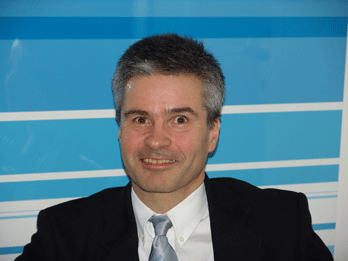 ACNFT:
Aleks, describe why WCS is especially important this year?
ACNFT:
Aleks, describe why WCS is especially important this year?
AP: We aim to intensify
the dialogue with the customer as emphasized during our Rome WCS held in
2008 and, further to find ways of battling the current world financial crisis.
Everywhere as commodity sales—as example
car sales—drop, buying power fades. The question we raised before
meeting in Bangkok is what additional steps can we take to further improve
the supply chain for the automotive and other industries?
To find out we interviewed many customers
asking them what their top three criteria are to choose air cargo for transporting
their goods.
Talking to the customer is vital because only
by exactly defining needs can we provide tailor-made solutions.
Here is the feedback:
A top criterion amongst eighty one percent
of responders was for more speed as most urgent and important.
But 69 percent of responders opted for reduction
of costs with 41 percent ranking higher reliability and better on-time performance
as most important.
Security in our survey was prioritized by
8 percent while environmental efforts was recognized as important by 5 percent
of all participants.
ACNFT: One surprising
result of those customer interviews is the comparatively low ranking of
green topics related to the air freight industry.
How can your organization emphasize this vital
issue to make it more popular?
AP: There is a
wide array of different steps ranging from getting rid of old freighters
that pollute the atmosphere to implementing new technologies and building
an efficient ground infrastructure. This we can recommend to airlines and
airports.
Taking the global view at IATA we strongly
reject a patchwork of different taxes or laws like the emission trading
schemes Brussels intends to implement in Europe.
Instead we support a harmonized strategy stretching
beyond national boundaries and markets.
ACNFT: After charting
the customer’s desires how does IATA react to better support the industry
and simplify processes?
AP: Well, there
are a number of tracks we intend to deepen during WCS to better the supply
chain.
One opportunity for not only speeding up processes
but also avoiding costs at the same time is our e-freight program.
Split by shipper, forwarder and airline, e-freight
could result in 4.9 billion U.S. dollars total annual cost savings since
up to 38 documents that accompany air freight shipments normally can be
eliminated.
Consequently, this issue is one of our key
objectives to push forward in close coordination with agents and cargo airlines.
A further major topic on our agenda is Cargo
2000 that will halve the links along the supply chain from something like
40 down to approximately 20. Presently, one million shipments per month
operate according to Cargo 2000 standards.
That’s a major target we already have
achieved.
But we aim at more to further improve the
daily performance, speed up transports and enhance security.
ACNFT: Coming back to
e-freight and the first WCS held at Mexico City in 2007: IATA promised to
introduce e-freight in six locations.
How far have you gone since then? Have the
promises been kept?
AP: Quite far.
e-freight has grown to 18 locations worldwide
with more to follow, step by step.
Things are accelerating daily in our efforts
to bring focus to simplifying process in air cargo.
As example CASS that started in 1979 is now
operated at 85 locations worldwide, but 45 percent of the locations have
delivered since WCS Mexico was held just two years ago.
The more CASS, the more savings are possible.
It’s as easy as that.
Presently, CASS manages an amount of 23 billion
dollars.
We as IATA have to take steps to protect that
money at banks.
During the last 13 months, 35 airlines have
gone bust, which is alarming by any standards or historical context. Looking
ahead, there are still some white spots on the CASS map.
We not only aim at the big markets like China
but target the smaller nations as well.
As example Lithuania, French Polynesia and
Estonia are locations where we established CASS last year.
However, there still remain some areas on
the globe that challenge us in bringing CASS into practical usage such as
the sub-Sahara region in Africa, Russia and parts of South America.
ACNFT: What are the
most important tracks this week in Bangkok?
AP: The aforementioned
e-freight targets, revenue optimization, quality improvements, innovations
and the understanding of route costs from the customer’s point of
view are our main Bangkok tracks.
Out of these tracks a list of actions will
be the result.
Their outcome will be reported at the WCS
in 2010 that will be held in the Americas. Exactly where that will be we
intend to announce at the Bangkok Symposium.
ACNFT: You moved from
an airline (BA) to become IATA’s Global Head of Cargo. How did this
affect your visions and perspectives?
AP: My vision was
not to deliver change to only one company but to an entire industry.
That’s a particular challenge that attracted
and still attracts me.
Ever since I’ve been working in a multi
cultural environment that enriches me and broadens my perspective. So if
you asked me if I’d take this step again my answer would be yes.
ACNFT: Now that Michael
Vorwerk has been named President of Cargo Network Services (CNS) in USA,
what’s next?
AP: Michael, we
believe has great credibility for all supply chain participants.
ACNFT: How would you
describe the main projects he’ll have to push forward?
AP: By the end
of 2008 we launched CASS together with United Airlines and forwarding agent
Lynden in domestic USA. This year we want to get more participants to join,
because the more players, the more volumes, the more savings. CASS is one
of the great strengths of CNS, generally speaking. Therefore, we’ve
got to carry this project further.
As example, e-freight in USA was implemented
at O’Hare and JFK last year.
Now in 2009 we are inviting other U.S airports
to join because carriers such as Asiana and Korean indicate that they are
very eager to have this capability at their North American destinations.
To round it up: CNS is one of the few big
assets IATA has in cargo.
Its major focus is still the USA but with
the global spreading of Cargo 2000, Miami-based CNS is taking over more
and more responsibilities worldwide. This importance of CNS and much more
will be demonstrated at our panels and meetings all this week in Bangkok.”
So it begins. IATA World Cargo Symposium this week could be remembered
as among the most important air cargo meetings in recent memory by providing
an unvarnished reality check for people in every part of air cargo to plug
into what’s important right now and what’s next when the ongoing
world financial nightmare finally makes its run to daylight.
Heiner Siegmund

Expectations |
|
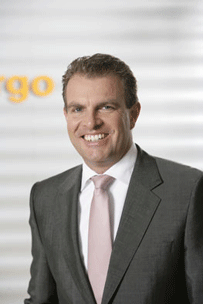 2009
is the Charles Darwin memorial year. Now, in analogy to the great British
naturalist’s groundbreaking findings he presented 150 years ago in
his “Origin of Species” the basics of his evolutionary theory
are seemingly being favored by a number of leading air freight managers,
too.
2009
is the Charles Darwin memorial year. Now, in analogy to the great British
naturalist’s groundbreaking findings he presented 150 years ago in
his “Origin of Species” the basics of his evolutionary theory
are seemingly being favored by a number of leading air freight managers,
too.
One such ‘Darwin supporter’ is
Lufthansa Cargo’s CEO Carsten Spohr who predicts that the present
economic crisis will accelerate the consolidation of the carriers with the
fittest and smartest surviving.
This they will achieve due to their professional
yield and capacity management combined with great market as well as operational
flexibility.
Providers however, like the many undercapitalized
airlines, the ones with old and inefficient aircraft, and probably some
of the dinosaurs in air freight too, will most likely die out. “This
crisis will separate the men from the boys” he predicts for the capacity
providers.
According to Spohr, Lufthansa Cargo clearly
belongs to the first category. After having left the valley the cargo crane
will be an even stronger market actor, he predicts. Why and by what means
his company will master the crisis to preserve or take industry leadership
in a number of fields he shared with Air Cargo News FlyingTypers
just before departing for IATA’s World Cargo Symposium in
Bangkok.
Here are Spohr’s essentials:
Leadership in quality: to safeguard quality
throughout the crisis will be of utmost importance. Despite the crisis,
carriers now have to prove their quality promise. He stresses that customers
must be shown that they can count on present and future reliability of financially
strong partners. Leadership from Spohr’s point of view also means
creating partnerships. Not only between forwarder and airline - but in creating
cooperations like Lufthansa Cargo has done in creating the Lufthansa Cargo
Group. “This group offers customers a unique dense worldwide network
and creates valuable synergies for both customers and group participants,”
says Spohr.
Looking at the agenda for 2009, Spohr is working
to successfully navigating Lufthansa Cargo through turbulent airspace. Lufthansa
Cargo has established a program to safeguard the earnings. It contains a
number of strategic and operational elements that can be put into practice
whenever needed. Main element of safeguarding the positive cash flow is
a flexible capacity policy. Accordingly, Lufthansa Cargo has returned three
freighters to lessor World Airways due to plummeting cargo volumes. Furthermore
Lufthansa Cargo Group reduced capacity in its own fleet by approximately
20 percent.
Next topic on the agenda for safeguarding
earnings was bringing down costs. One area is reduced work hours for ground
personnel in Germany. Affected are 2,600 staff members that have to work
20 percent less time for the months to come. Consequently, expenditures
for personnel have been cut without putting any of the existing 4,600 jobs
at stake.
“I would rather work for less time
and have less income in my pocket than losing my job completely,”
commented one of Lufthansa Cargo’s ground handlers. The cost-cutting
programme also includes cuts of the manager’s personal salaries together
with an 80 percent cap of expenditures for all departments within LH Cargo.
Finally, the carrier has decided to concentrate
on highly important projects and freeze some of the less urgent plans. According
to Lufthansa Cargo’s head of communication, Nils Haupt, the planned
demolition of the existing and the building of a new state-of-the-art Air
Cargo Center at their home-base Rhein-Main Airport is one of the projects
that’s been laid in the drawer, meanwhile. “We postponed the
modernization of some of our ground infrastructure because of a pending
night flight curfew that might be imposed here at Frankfurt. If so it would
substantially threaten our operational abilities,” Haupt argues. Therefore,
the project will remain on the waiting list until further notice.
But for Spohr crisis times are opportunity
times: “Crisis means risk but also chance. So we are intensively
looking at market opportunities. One example is the start of our MD-11 operation
from Milan to the U.S. And I am sure there are more opportunities to come.”
Carsten Spohr is well known for straight talk
preferring to acknowledge the cargo industry’s shortcomings. “We
trail other businesses that are more innovative, professionalized and technologically
advanced, like the major logistics players.” As tools for optimizing
the supply chain he emphasizes the enormous importance of both Cargo 2000
and e-freight. IATA is providing the common platform for quality parameters
but it’s the cargo carriers in close link with forwarders and shippers
that have to push them ahead.
Heiner Siegmund
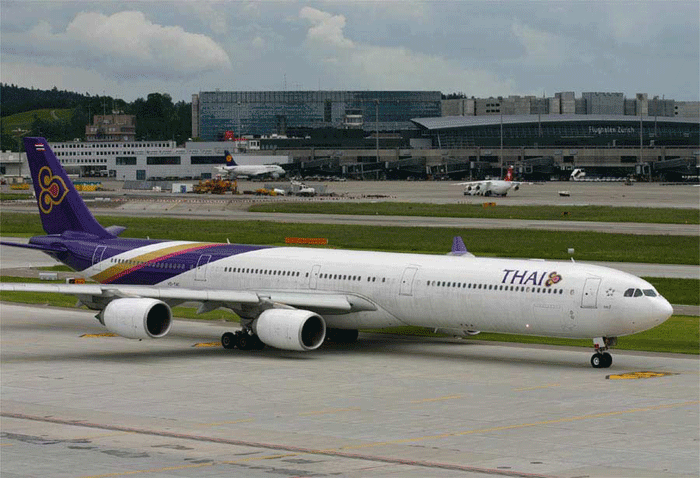
There is activity of immense importance to
the future of air cargo, a veritable giant leap from the ordinary that will
take place in Bangkok, Thailand this week as IATA hosts its Third World
Cargo Symposium (WCS) titled “Focus On The Customer-Delivering in
Turbulent Times”.
But when those thematic buzz-words were created,
it is doubtful that anybody imagined that hyper-turbulence, financial and
otherwise would be an ongoing worldwide phenomenon of 2009.
Maybe WCS ‘09 might have titled the
gathering “Dealing With Turbulessence or as our friend Mike Simon
the old PR pro at Emirates put it “Turbulessons” as tough times
sink in as an every day reality that may continue much longer than anyone
had expected or thought air cargo could stand when all of this began about
six months ago.
But however you view it, that large sucking
noise you have been hearing since October 2008 is the world financial meltdown
that is a real game changer bringing even more meaning to getting the process
of air cargo right.
The industry can count itself lucky that IATA
Cargo is meeting right now just as a large segment of the air cargo business
is wondering just what the hell has hit them amidst declining business and
increased expense especially in the security application.
Value for money is what moves IATA Cargo forward
into a vacuum created by widespread uncertainty as industry stakeholders
in ever expanding numbers hungry for information about what happens next
and also best industry practices seem to be everywhere and all at once.
The IATA World Cargo Symposium held annually
for the past two years, first in Mexico City and last year in Rome and this
week in Bangkok (March 2-5), eschews everything else, for meaningful air
cargo industry best practices sessions and three days of top level networking
amongst 800 or so most important air cargo people in the world.
If there ever was a time for the right people
to bubble up in air cargo when most needed, it’s now.
Aleks Popovich, IATA Head of Cargo seems to
take all of this one day at a time.
For a couple of years now since Aleks Popovich
took over as IATA Head of Cargo the man has been saying that our industry
has got to change drastically to embrace the world business environment.
Slowly with determination, extreme dedication
and purpose, that vision is coming into focus.
Now as world events continue to unfold challenging
every part of transportation as never before, IATA Cargo has been moving
to an even wider venue by pressing home the proposition of change, further
emphasizing e-business and other initiatives, offering the promise of vital
new opportunities for the air cargo industry.
“Since we recognize that the world is
fast becoming a single market, the industry needs to focus on bringing global
solutions to every facet of air cargo.
“The IATA Cargo E-Freight initiative,
and push for global harmonized security standards plus continued implementation
of Cargo 2000 are top priorities, Mr. Popovich insists."
Looking at Cargo 2000 and other aspects of
the IATA itiative for air cargo it is clear that Aleks Popovich has a vision
for air cargo and somehow he has been able to marshal the big and at times
cumbersome bureaucratic organization IATA into pointing to a heading in
the direction of real change for the industry.
Aleks has a heavy lift to be sure.
He deserves and in fact it is in our own self-interest
to support that effort.
So we will listen intently to the first day
self-imposed report card Aleks brings on progress and promises kept since
IATA Cargo met last year in Rome.
We will also make some plans to attend Cargo
Network Services (CNS) Annual Partnership Conference May 3-5, 2009 and meet
new CNS President Michael Vorwerk at La Costa Resort and Spa Carlsbad, CA.
where undoubtedly many of the WCS topics will get even further discussion.
Geoffrey
Suvarnbhumi Is Gold To Bangkok
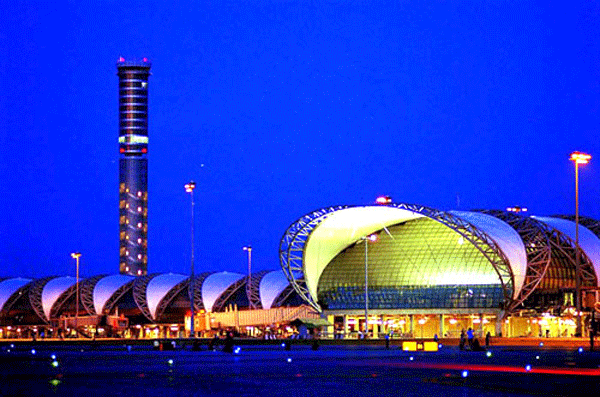
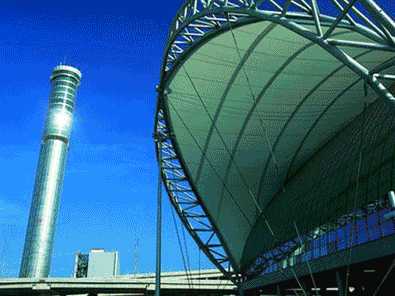 Famous one liner from Bangkok is that the view from the Air Traffic Control
Tower at Suvarnabhumi International Airport, now the world’s tallest,
is so high up at 132 meters (436 feet) you cannot see anything on
the ground.
Famous one liner from Bangkok is that the view from the Air Traffic Control
Tower at Suvarnabhumi International Airport, now the world’s tallest,
is so high up at 132 meters (436 feet) you cannot see anything on
the ground.
Whatever the long or short term view, proving
that nothing including even an occasional coup gets in the way of business
here, when in 2006 it came time for a ribbon cutting ceremony to celebrate
a new aerial gateway, Thailand King Bhumibol Adulyadej presided as reality
finally came to an ongoing project that has been in the works since the Monarch
who has ruled this land for more than 60 years (longest in the world) was
a mere Royal lad.
It probably didn’t hurt that HRH backed
the coups.
Backing the right side in a coup has been a
tender subject for a monarch who has seen more than a dozen and a half government
takeovers during his reign.
So far The Good King has come down on the right
side every time.
Despite being one of the more peaceful countries
in Southeast Asia, Thailand has a long history of coups.
“Business as usual” is the operative
quote here.
That means as you read this in early March
2009 with all the big shots from IATA and several high profile air cargo types
in town, airport hotels and restaurants are operating, and tours are touring.
By actual count Suvarnabhumi start to finish
took about 40 years to bring to market.
What Thailand and the world had delivered for
the wait, aside from the requisite glitches that made headlines when the placed
opened in 2006, is a huge and beautiful airport presently the largest
in the world.
While as mentioned the control tower soars
above it all here as the highest in the world, the passenger terminal building
is also touted as the largest single building on the planet.
But it doesn’t stop there.
BKK is a place of grand and integrated design
that also includes more Thailand touches after local criticism raised awareness
that the new airport could use a better sense of the local culture.
So now passenger gates at the airport are executed
in the leaf shape of the lotus flower.
BKK also has several gates for the Airbus A
380.
AoT the public company running six
major airports in Thailand, having moved Bangkok a giant leap forward in transportation
is certainly not faint of heart.
A state-of-the-art airport of superlatives
includes air cargo enabling Bangkok to have finally at least evened the playing
field versus all airports in the region, including Singapore-Changi and Kuala
Lumpur KLIA.
But if location and timing is everything then
in Southeast Asia this place, given some peace and quiet and a better world
economy could eventually pan out having a natural edge.
The name Suvarnabhumi means (the Land of Gold)
or Suvarnadvipa (the Island of Gold), depending on which scholar catches your
ear.
Like many other things here people seem to
take an almost perverse pleasure in disputing the exact definition.
But the origins of the airport’s name
lie in India where a vision and description of this place as a “Land
of Gold” originated.
Before the words Southeast Asia became common
usage after World War II, the region was often described as Further or Greater
India, and it was common to describe the Indonesian region or Malay Archipelago
as the East Indies.
The reason may be found in the fact that, prior
to Western dominance, Southeast Asia was closely allied to India culturally
and commercially.
For those keeping count, the history of Indian
expansion in the region goes back more than fifteen hundred years.
Two operators have been assigned to handle
air cargo at BKK, Thai Airways International and Bangkok Flight Services (BFS).
BFS Bangkok Flight Services (BFS), a joint venture of WFS and Bangkok Airways
operates cargo for a growing list of international clients.
Geoffrey

|
|
Publisher-Geoffrey Arend • Managing Editor-Flossie
Arend • Advertising Sales-Judy Miller
Send comments and news to geoffrey@aircargonews.com
Air Cargo News FlyingTypers reserves the right to edit all submissions
for length and content.
All Cargo Media, Publishers of Air Cargo News Digital and FlyingTypers
Copyright ©2009 ACM, Inc. All Rights Reserved. More@
www.aircargonews.com